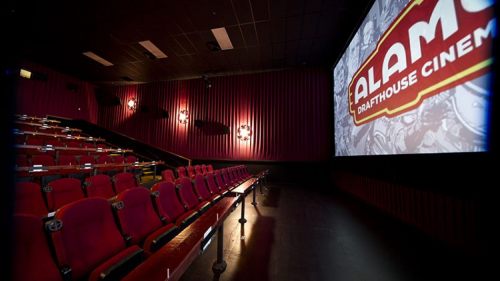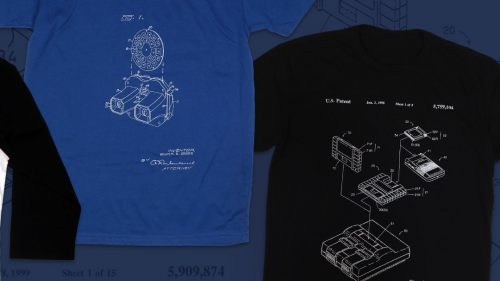The Alamo Drafthouse’s REEVESOLUTION Review: A Five-Movie Keanu Marathon
The Alamo Drafthouse’s Knockout Cinema marathons are rightfully some of its most popular events. Championed by programmer Greg MacLennan, they’re all-day affairs, showing five mystery movies honouring a particular movie star. These career retrospectives have pun-heavy names: Caged (one of which Nicolas Cage actually attended); Russellmania; Cruise Control.
This past Sunday, The Reevesolution was added to the annals of movie-marathon history. With five Keanu Reeves movies playing from original 35mm prints, and the Alamo kitchen doing themed specials, I leapt at the excuse to escape the Canadian winter and head down to Austin for a weekend. Joining a sold-out house, I settled in for ten hours of Keanu-worship.

1. Speed (1994)
The Reevesolution began with a sustained, two-hour bang, in the form of Jan de Bont's Speed. This ended up the highlight of the event for many, including myself - a welcome rewatch after years between drinks. I remembered Speed as a fun thriller, of course, but revisiting it now, with a greater understanding of how cinema works, really revealed its titanic strengths. It’s the Platonic ideal of action cinema, doing the “single, prolonged action setpiece” thing decades before Mad Max: Fury Road did, and never once letting up on the suspense (or the gas).
Jan de Bont directs the ever-loving shit out of Speed. He photographs its astonishing bus-vs-LA action practically and from a multitude of angles, always serving the narrative and never flashy for the sake of it. I’d entirely forgotten about its opening and closing sequences, on an elevator and subway respectively, but they too are lessons in constructing cinematic action. What’s more, the film’s cast - Keanu Reeves and Sandra Bullock’s chemistry, Dennis Hopper’s villainy, and the rogues gallery of character actors filling out the rest of the movie - absolutely elevate the material, making every character pop and mean something. That Speed created its own cinematic cliches is a testament to its brilliance. If you haven’t watched it in a while, do; it’s fucking fantastic.

2. The Devil’s Advocate (1997)
I didn’t see The Devil’s Advocate on original release. lt’s the kind of middle-tier film that sits endlessly in the “to-watch” pile, constantly being pushed down the list by higher-priority films. But Taylor Hackford’s thriller, starring Reeves as a rising-star Florida defense attorney and Al Pacino as the New York legal titan (and, oh, literal Satan) who hires him, is better than that. You don’t see this kind of movie made much anymore: a morality play for grown-ups, with a real budget, real movie stars, and a really really unlikeable protagonist.
From its opening scene, which tests the limits of Keanu’s innate charm by having him defend a child rapist by attacking his accuser’s credibility, to its climax, which sees Pacino bellowing a monologue for what feels like twenty minutes, The Devil’s Advocate is full of strange and effective choices. Keanu gives one of the stranger performances of his career, apparently spurred on by Pacino's raging oddness. One could imagine Darren Aronofsky turning this low-key supernatural thriller into some disturbing art masterpiece today; when viewed from the perspective of Charlize Theron’s character (the only one who sees and rejects the film's demons), it’s especially terrifying. More terrifying, certainly, than the film that followed it...

3. Constantine (2005)
The only post-Matrix film in the marathon, Constantine has seen a critical reappraisal in the decade-plus since its release, following director Francis Lawrence’s growth through I Am Legend, three Hunger Games films, and soon, Red Sparrow. Upon its original release, it was heavily criticised for being confusing, ponderous, and not The Matrix - not to mention a borderline-insulting adaptation of its Vertigo Comics source material. But as I'd seen several Film Twitter types defending the film lately, I was excited to see it again for the first time since its opening weekend.
The movie's still a mess. Some plotlines feel hacked down to the point of incomprehensibility; characters are introduced as significant only to rapidly disappear from the story; many key concepts in its lore simply go unexplained. While some of that can be excused as an attempt to avoid handholding, it makes the stakes unclear, the pacing uneven, and the story confusing. Whatever weird edits got made on the film or its screenplay damn near kill the movie.
But you know what? Despite all that, there’s a lot to like in Constantine. Lawrence’s moment-to-moment direction bears all the grim, stylish beauty of his later work, while the production design creates a myriad of simple, iconic images. Oddly enough, though, the film’s strongest suit is its acting. Keanu has rarely been better than as cancer-ridden, pathologically selfish demon-hunter John Constantine, selling the character’s nihilism and self-hatred without ever descending into glumness. Tilda Swinton and Peter Stormare, as Gabriel and Satan respectively, deliver unconventional and effective takes on their characters. It’s easy to forget that it was Swinton’s revelatory performance in this film that truly introduced her to mainstream audiences. Interestingly, the same goes for Shia LaBeouf, whose irritating kid-sidekick persona here would haunt him for over a decade; he’s not as bad as you remember, but boy, way to start off on the wrong foot. Constantine might not be the work of unrecognised genius overzealous Twitterers claim it to be, but it’s a moody, stylish bit of genre cinema - and just quietly, still better than most recent DC movies.

4. Bill & Ted’s Bogus Journey (1991)
The fourth film of the marathon was no surprise, thanks to a Skype call-in from Reeves’ Bill and Ted co-star Alex Winter. Friendly, forthcoming, and funny, Winter answered questions about the making of Bill and Ted's Bogus Journey - his favourite of the two films - and gave an update on the long-awaited third Bill and Ted movie. Winter's Bogus Journey anecdotes revolved around the team's determination to make a sequel as unlike the first film as possible, as well as the jovial, familial nature of the relatively small production. Sounds like it was a fun set.
Regarding Bill & Ted 3, Winter stressed that the project has been in development since 2007, but said it was “super close” to happening (spurred, I suspect, by an avalanche of other “legacy” sequels). Story leaks have dribbled out so consistently over that decade that I'm not certain what information is new, but here's what Winter told us: Bill and Ted have aged to find that their predicted destinies of fame, fortune, and cultural hegemony have not come true, throwing the universe into chaos, and must then travel across dimensions to find one in which they're not total fuckups. “A Christmas Carol meets Interstellar, with morons,” in Winter's words. Asked if any casting decisions had been made, Winter said that Jesus had been, and that he was particularly tickled by who they got - but he wouldn't divulge who that was.
As for Bill and Ted's Bogus Journey: as I'd only ever seen Excellent Adventure, this was another first-time viewing for me. Unlike many I spoke to, I vastly preferred it to the original film. Its karmic quest through Heaven and Hell feels more meaningful than a touristy trip through history; it has a ton of fun with alternate versions of its main characters; William Sadler gives a terrific deadpan turn as the Grim Reaper; and the production design is wonderfully weird and surprisingly expressionistic. In the context of the marathon, it also represented the third consecutive film featuring Keanu Reeves coming face-to-face with the Devil. Not bad, Keanu. Not bad at all.

5. Point Break (1991)
Speculation was rife as to how The Reevesolution would conclude. Would it be an obvious megahit like The Matrix? Something trashy and stupid like Johnny Mnemonic? Or something tonally left-field like River’s Edge? The answer was, of course, possibly the most Keanu movie ever made: Kathryn Bigelow’s Point Break, an action classic even before Hot Fuzz canonised it fifteen years later.
Point Break was the perfect starring vehicle for Keanu Reeves in 1991. It's where his carer pivoted from chilled-out, goofy youngster to chilled-out, serious action star, improbably finding a way to build both personae into its story. Keanu plays his role - an FBI agent undercover as a surfer - to perfection, maintaining a jovial chemistry with a support cast - Gary Busey, Lori Petty, and Patrick Swayze at his peak - that echoes Speed in its quality and consistency. Funny, exciting, and genuinely moving despite many parodies (and a remake), it’s easy to see why Point Break holds the reputation it does.
Rewatching Point Break in a theatre amplified its strengths, but also its weaknesses. Any given moment in Point Break is perfectly crafted, with Bigelow nailing its adrenaline-junkie action, fuck-you-buddy FBI banter, and dreamy surfer dialogue. But - and it’s entirely possible its position at the end of a five-film marathon influenced this response - its pacing and structure drags. The final hour feels stretched to breaking point, no pun intended, with a seemingly endless succession of action scenes that all feel like false climaxes. I can’t fault the film’s poetic ending, but getting there is absolutely exhausting. It’s a problem Bigelow has had elsewhere, too, but in such an otherwise-perfect movie, it feels particularly glaring here.
A projector breakdown meant that Point Break’s final reel saw a minor delay in screening, but once it was rectified, the reel played out and the marathon came to its conclusion. Everyone streamed into the foyer, dazed and tired, going home with sky-diving vouchers and Wyld Stallyns hats.
What we really took away, though, was a new appreciation for Keanu Reeves as an actor, screen presence, and movie star. Between the five features screened, and the dozen or so 35mm trailers that padded the show out, it was clear that Keanu’s output is incredibly consistent, thanks to smart choices of project and committed work on camera. Reeves isn’t a transformative actor exactly - you go to a Keanu movie to see Keanu - but he’s capable of modulating his screen persona in really clever ways, and like fellow superstar Tom Cruise, is never less than 150% invested in whatever scene he’s performing in.
Like all the best movie stars, Keanu Reeves is cinema personified. God bless him, and may John Wick 3 (which sadly prevented him from attending the event) fulfill all our greatest dreams. Party on, dudes.



